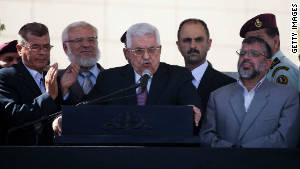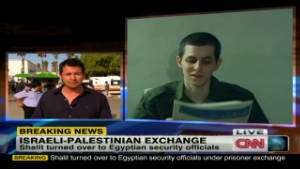(CNN) -- The dramatic Gilad Shalit-Palestinian prisoner swap gives a political boost to the anti-Israel Hamas movement, which negotiated the deal with Israel, analysts said.
It's seen as a practical achievement that outshines its main rival for Palestinians' loyalty, the Fatah movement, analysts said. And it comes just weeks after Fatah's leader, Palestinian Authority President Mahmoud Abbas, basked in international attention when he asked the United Nations for Palestinian statehood.
Saeb Erakat, who has been chief Palestinian negotiator, said he and the Palestinian Authority have been "talking to Israel for many many years about prisoners and the need to release prisoners and we could not convince them."
He acknowledged that "Hamas managed to do their part. ..."
 Abbas looks to future releases
Abbas looks to future releases
 Gilad Shalit talks about his freedom
Gilad Shalit talks about his freedom
 Gaza City celebrates prisoner swap
Gaza City celebrates prisoner swap
 Palestinian prisoners heading home
Palestinian prisoners heading home
Mark Regev, a spokesman for the Israeli government, said Israel would have preferred to deal with a group other than Hamas, which Israel and the United States view as a terrorist organization.
"I wish we could have conducted these negotiations through the Palestinian Authority," Regev said. "But they don't control the Gaza Strip and we had no alternative but to do these negotiations."
Hamas governs Gaza. Fatah controls the West Bank.
Hamas was a winner in the prison-swap deal while Abbas came out a loser, said Robert Danin, a senior fellow for Middle East and Africa studies at the Council on Foreign Relations.
Hamas looked like a state and like it was moderate, Danin said.
"Most importantly, it shows it is able to produce results through its approach," Danin said. "That's ultimately what matters in Palestinian politics."
Danin said Abbas is trying to win Palestinian statehood by diplomatic means at the United Nations and hasn't been able to come up with "real benefits" in his dealings with Israel.
"In contrast, Hamas just produced over a thousand prisoners."
Syria, weakened by the tumult during the Arab Spring, has been unable to restrain Hamas from doing this deal. In light of that, Hamas felt the need to be more "pragmatic," Danin said.
Abbas' efforts at the United Nations to get a Palestinian state dramatically put that issue front and center on the world stage and drew cheers from his people.
But an analysis last week in Foreign Policy notes that that the move helps Hamas. The "prisoner issue speaks to just about every Palestinian family" and Abbas popularity "would anyway be difficult to sustain if the U.N. move could not be morphed into something meaningful."
"The contrast was rather stark: Fatah leader Mahmoud Abbas was in South America being rebuffed by the Colombians in his appeal for support on the doomed-to-fail U.N. membership bid (Colombia is currently on the Security Council), while Hamas was securing concrete achievements back home," wrote Daniel Levy, who directs the Middle East Task Force at the New America Foundation.
Israeli forces have gone on offensives on Hamas' Gaza after militants fired rockets into Israel. By contrast, Israel has interacted for years with Abbas, long seen as a possible partner for peace.
Levy wrote that the "big question" is how the Shalit deal will affect efforts to achieve Palestinian unity.
"Hamas can now expect an uptick in support, especially given the stress they are placing on this being a united, national Palestinian achievement, reflected in the cross-factional list of prisoners to be freed. The achievement will be further boosted by the deal including so many lifers as well as Palestinians from Israel and from East Jerusalem.
"Hamas can chalk up a military achievement in having successfully kept the location of Shalit's captivity either secret or inaccessible for Israel," he said in "10 comments on the Israel-Hamas prisoner exchange deal."
Ido Zelkovitz, an expert in Palestinian society and politics who teaches in the Middle East studies department at Haifa University, wrote a column last week in Israel's Yedioth Ahronoth daily.
He said Hamas was pushed "aside with its back against the wall" as a result of Abbas' appearance at the United Nations and the fact that the Arab Spring "did not bring much good to the movement." It tried to get closer to Egypt as the Syrian uprising "limited the maneuvering options of the Damascus-based Hamas politburo."
He wrote that once the deal was signed, a path emerged for dialogue with intelligence officials in Egypt, a power broker in the deal. The recent Hamas-Fatah "reconciliation agreement was the first sign that Hamas was willing to make compromises on its way back to the center of the public square.
"The heightened tensions along the Egyptian border with Israel after the terror attacks near Eilat in August actually enhanced the dialogue between Israel and Egypt on a series of security-related matters. This dialogue was also a factor in promoting the prisoner swap deal, as Egypt wanted to prove that it was still a central player in the post-Mubarak era, and able to fulfill the role of the responsible mediator," Zelkovitz said.
Zelkovitz said that that Gazans were well aware that "Abbas succeeded in establishing state infrastructure, and concluded that Hamas has failed them. Hamas' inability to present a diplomatic achievement led the Hamas' Gaza leadership to apply extra pressure on Hamas' leadership in Damascus to push the deal forward."
He said the deal allows Hamas to "show that it too has achieved national success that will challenge Abbas." He said Abbas realizes there will be a "wave of Hamas popularity" when the prisoners return.
"As far as Hamas is concerned, the Shalit deal will enable it to bring to the Palestinian street a spontaneous wave of joy. In Palestinian eyes, the prisoners issue is one of the most important matters on the agenda and it enjoys a consensus. "
Zelkovitz said "the big question" is whether the public adulation "would translate into terrorism. If that does happen, Israel can back down from its commitments and thwart actions undertaken by those who would return to terrorist activities."

